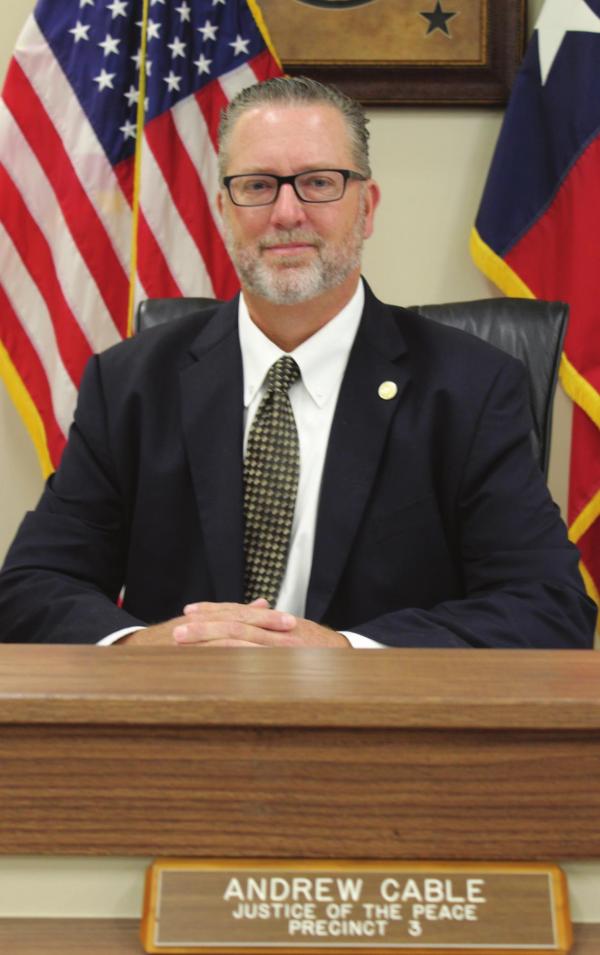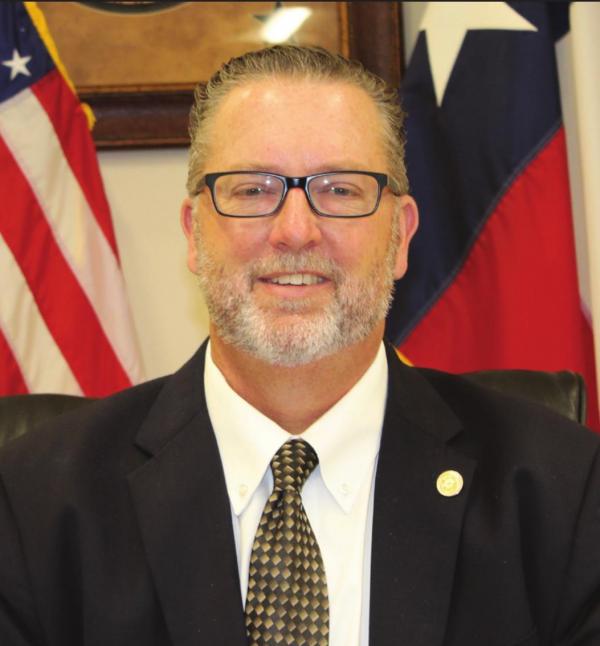Here comes the judge
Judge Andrew Cable is part teacher, part referee and all judge.
As the justice of the peace in Wimberley, Judge Cable hears small-claim disputes, issues involving juveniles, evictions, people contesting traffic tickets, and misdemeanor criminal cases such as fighting and public intoxication. In criminal cases, he can levy a fine of up to $500. When he’s deciding small-claims cases, the potential judgment increases to $20,000.
Judge Cable is not a lawyer. He has a master’s degree in criminal law from Texas State University and is required to take on-going classes. Judge Cable’s decisions are based on the law, common sense and more than 20 years on the bench.
When people bring a dispute before him he calmly explains the process in a no-nonsense manner, settles differences, asks questions and then decides who made the better case. He doesn’t study court documents beforehand so as to avoid prejudicing himself.
Often a lawyer is present during a trial. About 40 percent of the time, Judge Cable estimates, the parties involved represent themselves — which means they are likely unfamiliar with court proceedings and may be a little bit intimidated by the whole process. It’s only natural that people would speak out of turn or try to counter a point when they should be listening.
Judge Cable calmly explains how things work and steps in to assure one side or the other that they will have plenty of opportunity to present their side.
Tears shed
Even seemingly mundane matters can become emotional.
In a recent, pretty typical small-claims case, a local air-conditioning service owner sued a homeowner who was refusing to pay a $4,480 bill. The homeowner claimed the post-freeze work was not finished. The owner of the company countered that the vast majority of the work was complete and the remainder was held up due to other work that was being done on the house of which he had no control.
“I have a 50-50 chance of getting it right,” Judge Cable told the courtroom. “Y’all know everything about this case. I know nothing.”
When one of the parties involved would veer from proper procedure, Judge Cable would get things back on track. “It’s not a matter of being good (at presenting their case),” he explained. “It’s a matter of keeping it straight in my brain.”
Even though the case was about AC duct work (and $4,480), tears were shed on both sides. People become invested in their argument and convinced their cause is just.
The judge urged both sides to settle it among themselves. When they rejected that idea, Judge Cable announced, “I’ll be right back with your judgment” and disappeared through a side door.
Five minutes later he reappeared with a stack of papers and comes down on the side of the AC company. The homeowner was not happy and copied down information about possible appeal.
Judge Cable hears hundreds of cases like that each year.
He was first elected Justice of the Peace in 1998 and has been re-elected every four years since. People have urged him to run for other elected offices, but he’s happy where he is. “I’ll keep doing it until they get rid of me,” he says. “I just enjoy what I am doing here.”
Goes way back
The justices of the peace have been around for a long time. Back in the 1100s Richard “The Lionhearted,” the king of England, paid knights to enforce the law in certain areas. They were known as the “keepers of the peace.” Now nations all over the world employ justices of the peace to handle the everyday legal matters.
Probably the most famous justice of the peace in these parts is Judge Roy Bean, who ruled over West Texas in the 1880s. During a trial, the colorful Bean expected jurors to buy a drink in his saloon during a court recess. Thanks to movies and television —Judge Bean has been portrayed by Paul Newman, Walter Brennan and Ned Beatty — the Bean legend has grown. Authors Larry McMurtry and Zane Grey have written about him.
It’s said that once a worker on a railroad fell to his death from a bridge over the Pecos River. The worker was carrying a gun and $40. Bean fined the dead man $20 for carrying a concealed weapon, $10 for court costs and $10 for burial expenses. Case settled.
Bean labeled himself “the only law west of the Pecos.”
Judge Cable can be called the law west of San Marcos and east of Blanco County and north of Comal County. He is one of five Hays County justices of the peace and presides over about 47,000 people.
His duties breakdown into three basic areas:
— Criminal cases. Offenses such as fighting and public drunkenness. He also settles disputes over traffic tickets. He recalls one case where the officer wrote a speeding ticket and it was contested. The officer had an issue with his radar and Judge Cable voided the ticket. The officer wasn’t happy. “Was the guy speeding?” he asks. “Yeah, probably — I’m sure he was — but the burden of proof is on the state.” Judge Cable says these days the officer is friendly and waves when he sees him.
— Juvenile justice. Truancy is a common problem.
— Justice court. These are the small-claim cases, contract disputes and credit card problems as well as evictions. Evictions, says Judge Cable, are often the most emotional and heart wrenching. He remembers after one hearing, the woman being evicted grabbed hold of his leg as he was leaving the court and wouldn’t let go. “It’s a roller coaster when it comes to evictions,” he says.
Coroner as well
Judge Cable’s job is anything but 8 to 5. He’s also coroner and can be called at all hours to certify a death. Emergency medical personnel make sure someone is dead, then Judge Cable makes it official.
The death can be anything from an elderly person dying peacefully in bed to a gruesome traffic accident. Basically, he has to certify any “unattended” death — deaths not at a hospital or under hospice care. The judge often contacts a family doctor to verify the victim’s medical condition. If, for example, the deceased has a history of heart problems then an autopsy can be avoided. He figures he certifies 35-40 deaths a year.
Says Judge Cable: “I try to have a calming presence. You know, this could be the worst situation in these people’s lives.”
The judge recalls a time when a man walked out into a field and shot himself. It was raining hard that night and the emergency vehicles were having a hard time getting to the body so Judge Cable braved the mud, drove his truck out there and brought the body back himself.
He was coroner on the night of the 2015 Memorial Day flood in Wimberley.
There are other duties as well. He can issue protective orders and arrest warrants and set bonds for the accused. And — just like in the movies — as a justice of the peace, he can marry people.
He presides over about 10 weddings a year. He used to do more but these days a person can easily get a license over the internet to marry people. He tracks the people he’s married over the years and says 72 percent are still married. Overall, about 50 percent of the marriages in the United States end in divorce, so he’s got a decent record.
Judge Cable avoids pomp. He rarely wears a judge’s robe, opting for a business suit. But he does have a robe in the closet which he sometimes dusts off for a jury case.
In the courtroom, his questions are straightforward and in everyday language. Everyone gets a fair hearing. Nothing is rushed. You might say this is the real “People’s Court.”



